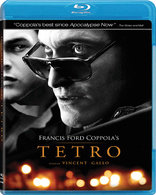Tetro Blu-ray Movie
HomeTetro Blu-ray Movie 
Lionsgate Films | 2009 | 127 min | Rated R | May 04, 2010Movie rating
7.1 | / 10 |
Blu-ray rating
| Users | 4.8 | |
| Reviewer | 3.5 | |
| Overall | 4.1 |
Overview
Tetro (2009)
An artistic immigrant family in Buenos Aires is marred by fierce rivalries, handed down through several generations.
Starring: Vincent Gallo, Maribel Verdķ, Alden Ehrenreich, Klaus Maria Brandauer, Carmen MauraDirector: Francis Ford Coppola
| Drama | Uncertain |
| Mystery | Uncertain |
Specifications
Video
Video codec: MPEG-4 AVC
Video resolution: 1080p
Aspect ratio: 2.35:1
Original aspect ratio: 2.39:1
Audio
English: DTS-HD Master Audio 5.1 (48kHz, 24-bit)
Subtitles
English, English SDH, Spanish
Discs
50GB Blu-ray Disc
Single disc (1 BD)
Playback
Region A (locked)
Review
Rating summary
| Movie | 3.0 | |
| Video | 4.5 | |
| Audio | 4.5 | |
| Extras | 3.0 | |
| Overall | 3.5 |
Tetro Blu-ray Movie Review
ďDonít look at the light.Ē
Reviewed by Dustin Somner May 3, 2010Itís difficult to review a film like Tetro without first mentioning the creative mind behind it. Francis Ford Coppolaís run the full gamut of critical reception over the years, earning unprecedented praise for The Godfather, and Apocalypse Now, before disappearing from the film industry to pursue a laid back life managing a vineyard. In 2007, Coppola re-emerged to direct what many considered an exercise in art over substance (Youth Without Youth), despite a touching story at its core. His latest venture doesnít stray far from the artistic conventions of this new period in the directorís career, but it stands as a more accessible story when compared to Youth Without Youth. After all, what human canít find some degree of connection with themes that involve rivalry, familial discord, and a failure to thrive in the shadow of greatness?
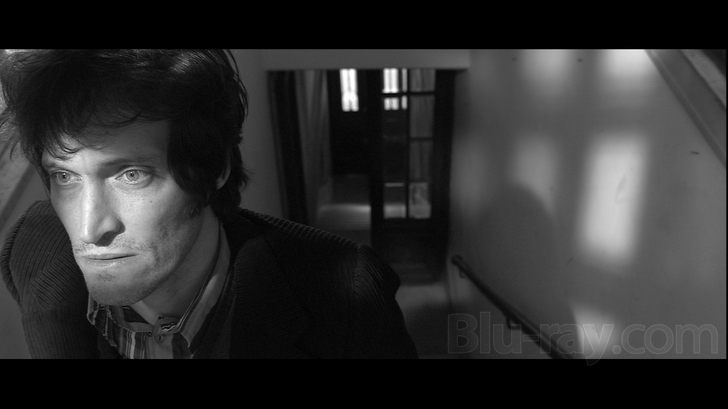
The use of lighting and shadows is astounding.
After years of internal struggle stemming from a toxic relationship with his father, Tetro (Vincent Gallo) escaped the hustle and bustle of New York in search of a peaceful life in Buenos Aires. After nearly a decade passed without even the slightest contact with his family, the 30-something writer reluctantly accepts an unannounced visit by his younger brother Bennie (Alden Ehrenreich), who recently took a service job aboard a cruise ship refueling in the local port. At first Tetro extends a cold welcome to his younger brother, making it abundantly clear he wishes to be left alone in his own state of artistic self-loathing. Looking up to his older brother and wanting little more than knowledge of their shared upbringing (the two men come from different mothers, but share the same famous composer as their father), Bennie digs deeper and deeper into a history Tetro would rather forget. Accepting Tetro will provide little of the information Bennie seeks, the exploratory young man discovers several suitcases filled to the brim with his brotherís musings on a tragic childhood and the circumstances that led to his self-inflicted exile. Recognizing the powerful message in the stories of this gifted writer, Bennie unravels their past in the pages describing a fatherís unforgiveable treachery, and begins work on a fitting conclusion to Tetroís tragedy.
I fully expect Tetro to divide audiences down the middle. On the one hand, youíll have the viewers that struggle to leave with something they can relate to, and find the Oedipus complex undertones a bit melodramatic. The other half of the audience will sympathize with the self-loathing artist, and praise Coppola for the shocking revelation that encompasses the final act of the film. Despite those two conflicting viewpoints on the story, my overall opinion rests somewhere closer to the middle. I enjoyed the style of the film, the basic premise behind the story, and the way Coppola molds scenes to match his artistic vision, but when I look back on the entire 127 minute feature, itís just feels a bit shallow. For a film built on the premise of a dark family secret causing one brother to abandon his sibling in favor of solitude, the payoff didnít carry much emotional weight. Iíll save any discussion of the conclusion for forum discussions laced with spoiler tags, but Iíd venture a number of viewers will be disappointed by the lack of substance in both the journey and the climax.
From an artistic standpoint, Coppola has never been better. The idea to shoot the majority of the film in black and white lends a nostalgic feel to the production that hearkens back to the days when Hollywood was about performances and scriptwriting. I love a good action film as much as the next guy, but thereís something to be said for the composition of a shot, and a directorís ability to paint a vision with his camera lens. In that regard, Coppola has established himself as one of the finest directors of his generation, and a true inspiration to upcoming artists in Hollywood.
Moving along to the acting in the film, my overall assessment is neither good nor bad. Vincent Gallo is an actor Iíve never been that impressed with (he plays the main role in many of his directorial efforts), and Iím well aware of the controversy surrounding his verbal spat with Roger Ebert over the film Brown Bunny. In the role of Tetro, he dances precariously between intensity and sleepwalking, as if heís never fully integrates into the character. To explain further, he does an exceptional job in scenes where heís flying off the handle, yet appears uncomfortably out-of-place in moments that require a soft faÁade. Aside from my reservations regarding Gallo, I have nothing but praise for the rest of the cast. In particular, the acting debut of Alden Ehrenreich reveals a young talent with limitless potential and an uncanny similarity to Leonardo DiCaprio (in his early days as an actor). Maribel Verdu is also wonderful as Miranda, Tetroís significant other. Her powerful character accepts the world for what it is, asking little in return.
Tetro Blu-ray Movie, Video Quality 
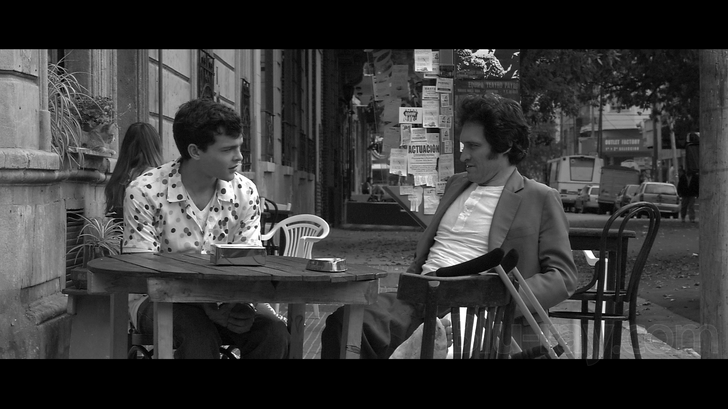
Presented in 1080p utilizing the AVC codec (at an average bitrate of 31Mbps), Tetro looks outstanding in high-definition. As I stated earlier, Coppola is the type of director who's so confident in his craft, that he'll throw all manner of visual style into his productions. Some may find this tampering intrusive or unnatural, but I love the bold statements he conveys in the compositions of various shots. Certainly some credit should be given to the cinematography of Mihai Malaimare Jr., who accepts both the honor and difficulty of working on such a visually demanding picture. To give you some idea of what you can expect from this Blu-ray edition of Tetro, we have approximately 80% of the film set in the present day and shot entirely in black and white. The other 20% consists of vintage color film stock that's cropped on both sides to symbolize home video photography during flashback sequences of Tetro's youth. Intermixed in these segments is ballet footage (also in color), which incorporate a blown-out, vivid color palette, lending an almost surreal look to dance-infused storytelling method. I know this likely reads like something out of a dream, and is difficult to visualize in a paragraph assessment, but the end result is a true feast for the eyes. Detail offers excellent clarity, black levels possess ink-like depth, and contrast never displays a hint of weakness. There's a fine layer of film grain permeating the dark background of several scenes, but I doubt many viewers will find it the least bit distracting.
Given the stylistic absence of color through the majority of the film, I wasn't sure what to expect from the high definition offering of Tetro. Now that I've witnessed the artistic style of the carefully crafted shots, and marveled at the contrasting splashes of color used sparingly throughout the feature, I'm extremely happy with Lionsgate's effort on this release.
Tetro Blu-ray Movie, Audio Quality 
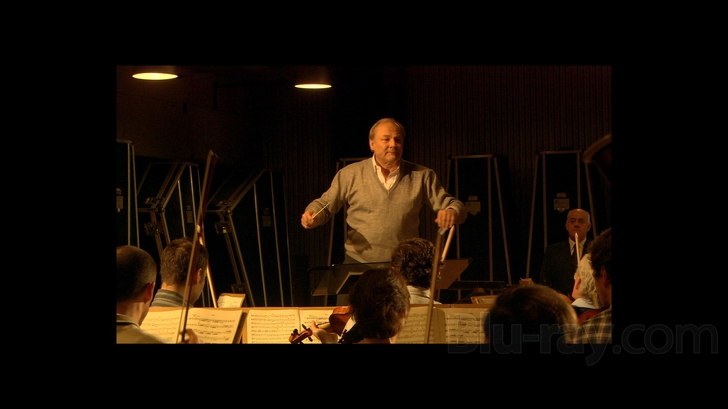
For a film built solely around dialog and music, Tetro incorporates a wonderful sense of depth and immersion. Bringing back the same composer who worked with Coppola on Youth Without Youth (Osvaldo Golijov), the film score nearly becomes a an individual character within the story, conveying emotions associated with innocence, tragedy, comedy, and companionship. On occasion, the jazz-inspired numbers are cast aside in favor of sweeping operatic pieces that correspond with the onscreen ballet segments. This contrasting style can be a bit jarring at first, but when you consider the unnerving nature of the overall story, the dichotomy seems fitting. From a dialog standpoint, the audio mix never misses the mark, creating a volume balance that carries appropriate weight next to other elements in the mix. There are several moments when environmental effects take a prominent role that extends beyond the rear surround stage, but they act as placeholders for symbolic moments in the story (such as the creak of a door handle, or the bone-crunching sound of a motor vehicle accident), and never felt out of place.
In the end, this is a fine audio presentation that may surprise some viewers. The drama genre isn't well-known for robust auditory delivery, but Tetro manages to break from those conventions in all of the right ways.
Tetro Blu-ray Movie, Special Features and Extras 

Feature-length Audio Commentary with Francis Ford Coppola and actor Alden Ehrenreich: The two contributors on the audio commentary recorded their segments separate from one another, but the topics they address flow with relative ease. When the commentary is at its best, Coppola touches on the parallels between the story and his own family, the intricacies of working outside the Hollywood studio system, and the acting choices for the film (he originally intended Matt Dillon for the role of Tetro, but the actor was busy at the time).
The Ballet (1080i, Dolby Digital 2.0, 8:06 min): Coppola explains the use of ballet as a metaphor within the story, and the influence The Red Shoes (1949) played on these sequences.
Mihai Malaimare, Jr.: The Cinematographer of Tetro (1080i, Dolby Digital 2.0, 8:30 min): As the title implies, this interview segment features the Mihai Malaimare as he discusses the challenges of working in black and white and delves into the visual style he and Coppola were attempting to capture.
The Rehearsal Process (1080i, Dolby Digital 2.0, 8:33 min): More than anything, this supplement demonstrates the differing artistic style of Vincent Gallo and Francis Ford Coppola, since the actor prefers zero rehearsal, and the director insists on it. The clips seem to establish subtle tension between the two, but they eventually find a happy medium.
Osvaldo Golijov: Music Born from the Film (1080i, Dolby Digital 2.0, 9:16 min): The composer behind Tetro provides his thoughts on the musical arrangements in the film, which he labels "nostalgic optimism".
La Colifata: Siempre Fui Loco(I've Always Been Crazy)(1080i, Dolby Digital 2.0, 5:47 min): Coppola shot the La Colifata sequence on location at a psychiatric hospital in Buenos Aires, where they actually use the radio-show treatment portrayed in the film.
Fausta: A Drama in Verse (1080i, Dolby Digital 2.0, 4:34 min): This supplement presents a longer version of the Fausta play from the film (uninterrupted).
Tetro End Credits (1080i, Dolby Digital 2.0, 3:32 min): The end credits presented at the conclusion of the film are extremely short, so this extra simply provides everyone with their due credit.
Tetro Blu-ray Movie, Overall Score and Recommendation 
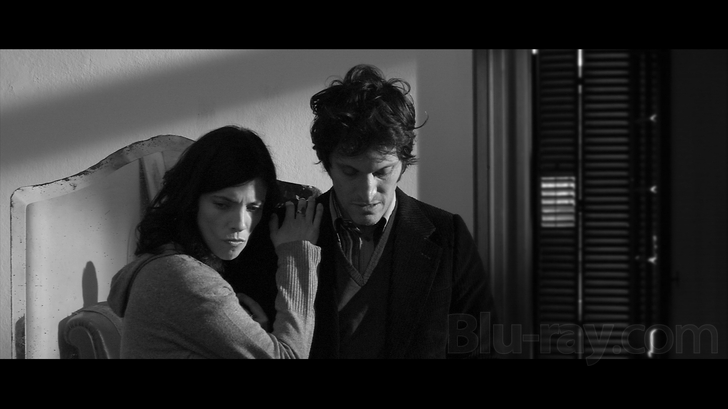
Tetro isn't the masterpiece many critics made it out to be, and it definitely isn't Coppola's dramatic return to top form. In my opinion, your enjoyment of the film will depend entirely on your expectations from the outset. Coppola set out to write, direct, and independently produce an art-house film that strikes a personal cord within. He didn't craft a masterpiece along the lines of Apocalypse Now or The Godfather (despite a false assertion on the cover of the Blu-ray case), so entering this experience with expectations of a rumored return to his early days have been grossly overstated by a film community hoping for the second coming. That's not to say the film deserves a tarnished assessment as a result, but those who found Youth Without Youth a bit too artsy may walk away with the same feeling of alienation after Tetro. As a result, I'd recommend most viewers stick with a preliminary rental prior to making a final decision on owning Coppola's latest experiment in artistic expression.
Similar titles
Similar titles you might also like

One from the Heart 4K
1982

The Forbidden Room
2015

Waves
2019

Men of Honor
2000

Corpus Christi
Boże Ciało
2019

Her Smell
2018

The Club
El Club
2015

Black Swan
2010

The Ticket
2016

Nebraska
2013

Mildred Pierce
2011

100 Streets
One Square Mile
2016

Six: Season 1 and 2
2017-2018

Touchy Feely
2013

Lilith
1964

Ordinary People
Paramount Presents #30
1980

Scent of a Woman 4K
1992

Ballast
2008

Is Anybody There?
2008

The Lost City
2005
